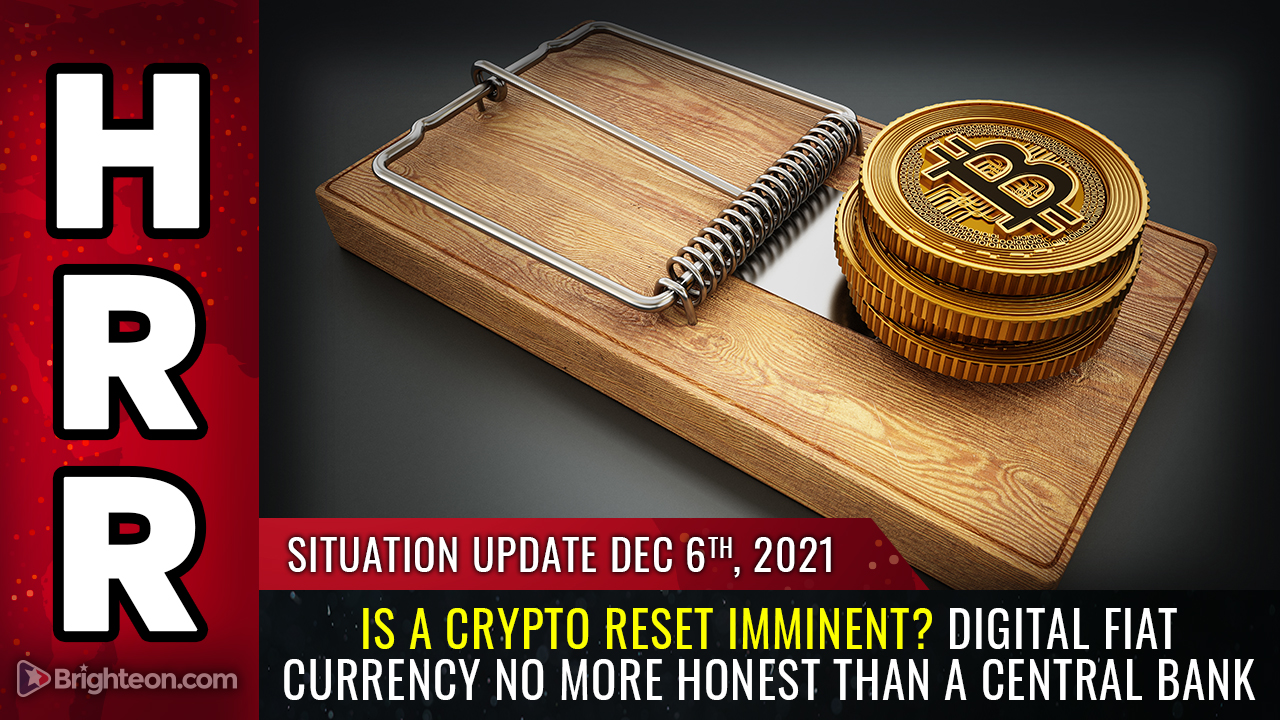El Salvador adopts bitcoin as legal tender to unsteady start characterized by glitches
09/09/2021 / By Ramon Tomey

The tiny Central American nation of El Salvador saw a rocky start on its first day of adopting the bitcoin cryptocurrency as legal tender. The country passed a law in June 2021 mandating its use as legal currency alongside the U.S. dollar. But the first day of the rollout on Sept. 7 hit a roadblock after many people tried to download the Chivo e-wallet, forcing authorities to take the app down for a few hours.
Salvadorian President Nayib Bukele announced plans to allocate more than $225 million to roll out the government-run Chivo e-wallet, which can be used to purchase things in bitcoin or U.S. dollars. Citizens who sign up for Chivo were set to receive bitcoin credit worth $30. Aside from this, Bukele’s administration also announced plans to implement a network of 200 bitcoin ATMs. A chain of Chivo kiosks at plazas around the country to introduce Salvadorians to cryptocurrency were also included in the plan.
However, the Chivo e-wallet remained unavailable on major app stores during the early hours of Sept. 7. A number of Salvadorians took to social media to lament the difficulties they encountered as soon as it showed up on app stores. They were unable to sign up for the wallet using their phone numbers or official IDs. On the other hand, many citizens posted images of establishments, such as McDonald’s and Pizza Hut, accepting bitcoin as payment.
Meanwhile, the Chivo kiosk at the Antiguo Cuscatlan square in the capital San Salvador saw little activity on the first day of the rollout. A team of young people in charge of promoting Chivo anxiously stared at their mobile phones as some residents inquired about the e-wallet.
Sixty-one-year-old Luis Aleman told the Wall Street Journal (WSJ) that he plans to use Chivo to receive remittances from his children based in the U.S. He added that he hopes to save on fees charged by other companies when he remits money using the app. “There are always glitches, but these problems don’t mean anything. One more day of waiting doesn’t affect me,” he said.
Jose Luis Guillen, the founder of Central American foreign exchange platform Coincaex, said of El Salvador’s bitcoin rollout: “We are very eager to see how the ecosystem develops.” Blockchain.com Head of Research Garrick Hileman meanwhile described the Central American country’s adoption of cryptocurrency as “a pretty monumental step in the evolution of bitcoin.” (Related: El Salvador becomes first country to adopt bitcoin as legal tender.)
Not everyone welcomed bitcoin with open arms
However, Bukele’s decision to make bitcoin legal tender in El Salvador faced criticism from both academics and regular citizens. Central American Institute for Financial Studies Senior Economist Ricardo Castaneda warned: “The [Salvadorian] government is betting more than $200 million in a virtual casino, and that’s taxpayer money.
Clothing store owner Jorge Hasbun told WSJ that he was startled upon hearing the announcement. The head of the El Salvador Chamber of Commerce and Industry said the initiative was rushed without consultation with stakeholders or the private sector. Furthermore, he added that regulations disclosed at the last minute had been insufficient.
Hasbun said: “If a client comes to pay with bitcoin, I’m not ready. We could have ridden that wave in a positive way, but the way the law was imposed wasn’t positive.”
The first day of the bitcoin rollout also saw protests held in front of the Salvadorian Ministry of Finance, Al Jazeera reported. Marvin Rivera, a student at the University of El Salvador, said: “I want to be clear that I don’t oppose Bitcoin. What we are against is the process that has happened and that we never had any say in this.”
Another student, Daniela Romero, said her concern about the volatility of cryptocurrencies joined the Sept. 7 protest. She explained: “If we don’t understand Bitcoin, then people will lose money when the price drops. We need a lot more education, or people will be taken advantage of.”
Students were not only the ones who opposed El Salvador’s use of cryptocurtency. Veterans from the country’s civil war that lasted from 1979 to 1992 protested in August to demand pension benefits and assurances that these would not be denominated in bitcoin.
Fifty-six-year old Jose Alberto Amaya, a former military officer, said bitcoin is for countries “with more advanced techonology and stronger economies.” Meanwhile, former rebel Juan Manuel Pineda described the adoption of bitcoin as “a wild economic adventure.” He asked: “How are we going to use bitcoin if we don’t even have a smartphone, or the money to have internet access?”
Pineda’s opposition to bitcoin carried some weight as the technology needed for cryptocurrency remained out of reach for poor Salvadorians. Reuters reported that nearly half of El Salvador’s population has no access to the internet, with many more having spotty connectivity. Sweets seller Jose Herrera, who had trouble accessing a mobile phone, said: “I’m going to continue suffering with or without bitcoin.”
Oswaldo Serrano, who owns online pet food delivery service Smart Pet SV, brought up possible privacy concerns arising from the use of the Chivo e-wallet. “You hand over all your data to the government, your financial movements, what goes out and what goes in,” he said.
According to Salvadorian officials, bitcoin’s adoption would lead to affordable financial services in the country. However, a survey by the Universidad Centroamericana Jose Simeon Canas in early September 2021 found that more than 65 percent of citizens do not want the government to spend tax dollars on adopting bitcoin. Moreover, the same poll found that 80 percent have little to no confidence in bitcoin. (Related: Bitcoin payments now so SLOW and expensive that a prominent Bitcoin conference has stopped accepting Bitcoin for payment.)
BitcoinCollapse.news has more articles about El Salvador’s adoption of bitcoin as legal tender.
Sources include:
Tagged Under: ATM machines, bitcoin, business owners, Chivo app, crypto tokens, cryptocurrency, currency exchange, El Salvador, electronic wallet, legal tender, Nayib Bukele, robot economy
RECENT NEWS & ARTICLES
COPYRIGHT © 2017 BITCOIN CRASH NEWS

















